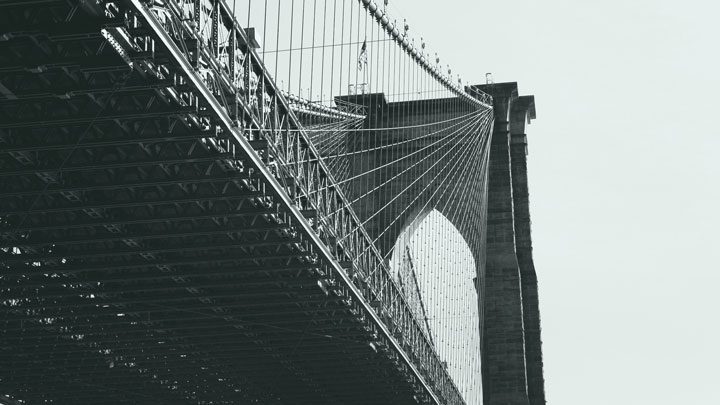Walker Evans Saves The Bridge by Benjamin Goluboff
Their fathers had been, if not friends, associates in the elaborate network of capitalist exchange whose ramifications seemed to extend to the very boundaries of the Columbus Heights neighborhood where the two young men, along with certain kindred spirits, had established a kind of demi-monde.
And so it was only natural, when brought together by clerical positions in a Manhattan brokerage firm, that the two young men should have become, if not friends, colleagues perhaps, co-aspirants at least, to positions in the artistic firmament that they each desired fiercely.
Hart was queer; Walker somewhat less so, and when, after certain comic misdirections, this asymmetry became clear to them both, their relations settled into comfortable routines: high-minded talk, largely about the French (Baudelaire, Cendrars, Atget); walks across the Brooklyn Bridge (its cables a latticework of vertigo), and drink.
But drink, to Walker a diverting pastime, was to Hart a vocation or calling, a sacred flame he tended with single-minded assiduity and resolve, a categorical imperative to which all else—Hart’s poems, his slender portion of the family money, his friends and lovers—were so much ancillary chatter.
A slave to this vocation, Hart moved through his days, it seemed to Walker, cloaked in a nimbus of chaos, as the goddess of love, sang Virgil, moved in a nimbus of charm; Hart’s charm: broken dishes, bruised friendships, debt, mess, and sailors, always sailors, a priapic, abusive string of them that left Hart spent and battered and unsteady on his feet.
And always, Walker saw it a dozen times, a wake of self-loathing followed the departing fleet, leaving the poet liable to self-doubt and even self-harm; Walker saw him take a ball-peen hammer to his own finger once when the latest bluejacket decamped, saw him scissor up a brand new gabardine suit, as if he were cutting out the part of himself that craved what he despised.
One particularly bad night, as Hart was doing Ophelia’s mad scene in the other room, Walker took the poet’s manuscript from his desk and, fearing it might come to grief as another surrogate for Hart’s desire, saw himself out the door with it, put it on the shelf in his room, and went to bed.
Sleep, however, came slowly to Walker, who feared for his friend’s well-being, worried that he might have overstepped himself in removing the poems, and conceived, as sleep finally approached, of the manuscript as an alien agency in the darkened apartment.
He fell at last into a confused and vivid dreaming: a train rolled on gleaming tracks toward a gleaming bay, an American Indian maiden clad in skins gestured to a horizon of verdant hills; a man of sad red eyes peered into the glooms of the IRT, and the bridge, Hart and Walker’s bridge, stood revealed as a harp above the harbor.
The next morning Hart reclaimed the manuscript, a show of hauteur imperfectly concealing the poet’s embarrassment, and three years later he was dead, gone over the rail of a steamship homeward bound from Mexico; Walker grieved him, of course, but came to remember him more as cautionary tale than friend.
“The Bridge,” when it appeared not long before the poet’s death, bore on its frontispiece Walker’s photograph of suspension cables shot from the walkway one summer day with Hart.
Benjamin Goluboff teaches English at Lake Forest College. He’s placed stories, essays, and poems in many small-press journals. You can read some of them here: www.lakeforest.edu/academics/faculty/goluboff/
